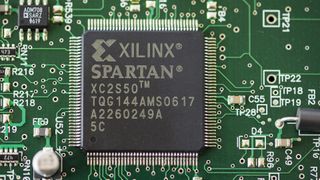Biden pledges to address the growing chip shortage crisis
The administration is working with businesses to identify and mitigate bottlenecks in semiconductor supply

The Biden administration has said it’s exploring options to address the global semiconductor shortage, which is affecting automotive production.
Talking to reporters, White House press secretary Jen Psaki said the administration is working with businesses to identify and mitigate bottlenecks in semiconductor supply. President Biden will also sign an executive order to begin a 100-day review by the National Economic Council and National Security Council, she said.
The news comes as semiconductor industry leaders in the US wrote to the president, asking him to fund semiconductor manufacturing and research in the administration's economic recovery and infrastructure plan.
The Semiconductor Industry Association (SIA) warned that the US share of global semiconductor manufacturing capacity has decreased from 37% to 12% since 1990. This is primarily due to government subsidies in other regions and stagnation in federal investment. Last year, Congress proposed legislation to increase domestic investments in the semiconductor industry.
A computer chip shortage has escalated recently, leaving automotive manufacturers scrambling for supplies. Ford shuttered its Louisville, Kentucky plant this week, citing a component shortage. Earlier this month, General Motors announced it had ordered a shutdown at three plants in the US, Mexico, and Canada while slowing production at a South Korean facility, all because of the chip shortage.
Recently, the shortage has spread to tech manufacturers, including Sony, which reportedly said supplies of its new consoles might be affected. This week, Nvidia also said it would have to use older graphics cards to cope with the shortage, while Lenovo said it would manage the supply crunch with its size and buying power.
The pandemic contributed to the chip shortage, which the SIA said emerged in Q2 2020 and affected the semiconductor sector’s revenues that year. Automakers scaled back on chip procurement as they temporarily closed plants in response to COVID-19, they said. However, electronic goods manufacturers began stockpiling chip inventories as demand for their products increased due to more remote working and education, putting a strain on the supply chain.
Get the ITPro. daily newsletter
Receive our latest news, industry updates, featured resources and more. Sign up today to receive our FREE report on AI cyber crime & security - newly updated for 2024.
Industry officials have also blamed the Trump-era sanctions against China, a leading producer of semiconductors, for the shortage. The US also banned Chinese chip maker Semiconductor Manufacturing International (SMIC) from using some US tools to make chips.
Ramping up production won’t be easy, and manufacturing lead times average 26 weeks, said SIA experts. They expect the shortage to alleviate as manufacturers adapt their output, but that will take time.
Danny Bradbury has been a print journalist specialising in technology since 1989 and a freelance writer since 1994. He has written for national publications on both sides of the Atlantic and has won awards for his investigative cybersecurity journalism work and his arts and culture writing.
Danny writes about many different technology issues for audiences ranging from consumers through to software developers and CIOs. He also ghostwrites articles for many C-suite business executives in the technology sector and has worked as a presenter for multiple webinars and podcasts.





